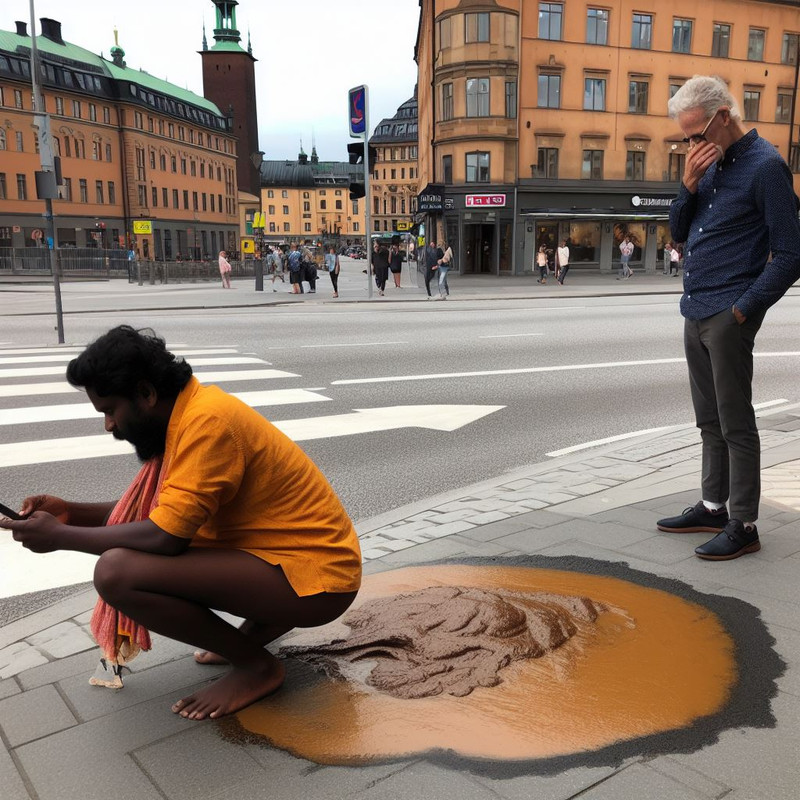《纽约时报》:印度媒体如何在战争的鼓声中放大虚假信息
版主: Softfist
-
wanmeishijie(石昊)楼主
- 论坛元老

wanmeishijie 的博客 - 帖子互动: 2090
- 帖子: 68878
- 注册时间: 2022年 12月 10日 23:58
#1 《纽约时报》:印度媒体如何在战争的鼓声中放大虚假信息
李奇微,你来批判下纽约时报?
---------------------
The news reports chronicled India’s overwhelming successes: Indian attacks had struck a Pakistani nuclear base, downed two Pakistani fighter jets and blasted part of Pakistan’s Karachi port, the country’s oil and trade lifeline.
Each piece of information was highly specific, but none of it was true.
Disinformation on social media in the days during and since India and Pakistan’s intense military confrontation last week has been overwhelming. Sifting fact from fiction has been nearly impossible on both sides of the border because of the sheer volume of falsehoods, half-truths, memes, misleading video footage and speeches manipulated by artificial intelligence.
But some of that flood also made its way into the mainstream media, a development that alarmed analysts monitoring the evolution of outlets in India once trusted for their independence. The race to break news and a jingoistic approach to reporting reached a fever pitch during the four-day conflict, as anchors and commentators became cheerleaders for war between two nuclear-armed states. Some well-known TV networks aired unverified information or even fabricated stories amid the burst of nationalistic fervor.
And news outlets reported on a supposed strike on a Pakistani nuclear base that was rumored to have caused radiation leaks. They shared detailed maps that purported to show where the strikes had been. But there was no evidence to uphold these claims. The story of the Indian Navy attacking Karachi was also widely circulated. It has since been discredited.
“When we think of misinformation, we think of anonymous people, of bots online, where you never know what the source of the thing is,” said Sumitra Badrinathan, an assistant professor of political science at American University who studies misinformation in South Asia. Social media platforms were also rife with misinformation during India’s 2019 conflict with Pakistan, but what was notable this time, Dr. Badrinathan said, was that “previously credible journalists and major media news outlets ran straight-up fabricated stories.”
“When previously trusted sources become disinformation outlets, it’s a really large problem,” she said.
The misinformation shared on mainstream media platforms about the conflict between India and Pakistan is the latest blow to what was once a vibrant journalism scene in India.
Image
Several men stand next to their motorbikes on an otherwise empty, narrow cobblestone street.
Shopkeepers in Jammu City, India, after the cease-fire earlier this month.Credit...Atul Loke for The New York Times
Warring sides have spread lies and propaganda for as long as there has been armed conflict. And mainstream news outlets have not been immune from presenting their countries’ battlefield efforts in a favorable light or from, at times, rushing to publish information that later turns out to be incorrect.
But social media has exponentially increased the potential for misinformation. And in India, there has been a steady erosion of free speech since Prime Minister Narendra Modi came to power in 2014. Many news outlets have been pressured into suppressing news damaging to the government’s reputation. Others, including many big television networks, have come to promote the government’s policies. (Some small independent online news publications have pursued more accountable journalism, but their reach is limited.)
GEMINI总结:
这篇英文报道总结了印巴近期军事冲突期间和之后,社交媒体上以及部分印度主流媒体上充斥着大量虚假信息的现象。
报道指出,一些印度媒体传播了关于印度袭击巴基斯坦核基地、击落巴方战机以及轰炸卡拉奇港口的具体但均不实的消息。这些虚假信息包括不实报道、半真半假的消息、表情包、误导性视频以及人工智能操纵的演讲。
令人担忧的是,一些一度被认为是独立可靠的印度主流媒体也加入了传播虚假信息的行列。在为期四天的冲突中,这些媒体为了抢发新闻,采取了一种狂热的民族主义报道方式,主播和评论员成为了战争的鼓吹者,一些知名的电视台播出了未经证实甚至捏造的故事。
报道援引美国大学政治学助理教授Sumitra Badrinathan的观点,认为这次印巴冲突中值得注意的是,以往可靠的记者和主要媒体新闻机构直接传播了捏造的故事。她强调,当以前值得信任的消息来源变成虚假信息的传播者时,这是一个非常严重的问题。
文章还提到,社交媒体的出现极大地增加了虚假信息的传播潜力。自2014年印度总理莫迪上任以来,印度的言论自由受到持续侵蚀,许多新闻机构面临压力,被迫压制不利于政府声誉的新闻。包括许多大型电视台在内的其他媒体则开始宣传政府的政策。一些小型独立的在线新闻机构坚持更负责任的新闻报道,但其影响力有限。
总而言之,这篇报道揭示了在印巴冲突期间,虚假信息不仅在社交媒体上泛滥,而且渗透到部分印度主流媒体,这对印度曾经充满活力的媒体环境造成了打击。
---------------------
The news reports chronicled India’s overwhelming successes: Indian attacks had struck a Pakistani nuclear base, downed two Pakistani fighter jets and blasted part of Pakistan’s Karachi port, the country’s oil and trade lifeline.
Each piece of information was highly specific, but none of it was true.
Disinformation on social media in the days during and since India and Pakistan’s intense military confrontation last week has been overwhelming. Sifting fact from fiction has been nearly impossible on both sides of the border because of the sheer volume of falsehoods, half-truths, memes, misleading video footage and speeches manipulated by artificial intelligence.
But some of that flood also made its way into the mainstream media, a development that alarmed analysts monitoring the evolution of outlets in India once trusted for their independence. The race to break news and a jingoistic approach to reporting reached a fever pitch during the four-day conflict, as anchors and commentators became cheerleaders for war between two nuclear-armed states. Some well-known TV networks aired unverified information or even fabricated stories amid the burst of nationalistic fervor.
And news outlets reported on a supposed strike on a Pakistani nuclear base that was rumored to have caused radiation leaks. They shared detailed maps that purported to show where the strikes had been. But there was no evidence to uphold these claims. The story of the Indian Navy attacking Karachi was also widely circulated. It has since been discredited.
“When we think of misinformation, we think of anonymous people, of bots online, where you never know what the source of the thing is,” said Sumitra Badrinathan, an assistant professor of political science at American University who studies misinformation in South Asia. Social media platforms were also rife with misinformation during India’s 2019 conflict with Pakistan, but what was notable this time, Dr. Badrinathan said, was that “previously credible journalists and major media news outlets ran straight-up fabricated stories.”
“When previously trusted sources become disinformation outlets, it’s a really large problem,” she said.
The misinformation shared on mainstream media platforms about the conflict between India and Pakistan is the latest blow to what was once a vibrant journalism scene in India.
Image
Several men stand next to their motorbikes on an otherwise empty, narrow cobblestone street.
Shopkeepers in Jammu City, India, after the cease-fire earlier this month.Credit...Atul Loke for The New York Times
Warring sides have spread lies and propaganda for as long as there has been armed conflict. And mainstream news outlets have not been immune from presenting their countries’ battlefield efforts in a favorable light or from, at times, rushing to publish information that later turns out to be incorrect.
But social media has exponentially increased the potential for misinformation. And in India, there has been a steady erosion of free speech since Prime Minister Narendra Modi came to power in 2014. Many news outlets have been pressured into suppressing news damaging to the government’s reputation. Others, including many big television networks, have come to promote the government’s policies. (Some small independent online news publications have pursued more accountable journalism, but their reach is limited.)
GEMINI总结:
这篇英文报道总结了印巴近期军事冲突期间和之后,社交媒体上以及部分印度主流媒体上充斥着大量虚假信息的现象。
报道指出,一些印度媒体传播了关于印度袭击巴基斯坦核基地、击落巴方战机以及轰炸卡拉奇港口的具体但均不实的消息。这些虚假信息包括不实报道、半真半假的消息、表情包、误导性视频以及人工智能操纵的演讲。
令人担忧的是,一些一度被认为是独立可靠的印度主流媒体也加入了传播虚假信息的行列。在为期四天的冲突中,这些媒体为了抢发新闻,采取了一种狂热的民族主义报道方式,主播和评论员成为了战争的鼓吹者,一些知名的电视台播出了未经证实甚至捏造的故事。
报道援引美国大学政治学助理教授Sumitra Badrinathan的观点,认为这次印巴冲突中值得注意的是,以往可靠的记者和主要媒体新闻机构直接传播了捏造的故事。她强调,当以前值得信任的消息来源变成虚假信息的传播者时,这是一个非常严重的问题。
文章还提到,社交媒体的出现极大地增加了虚假信息的传播潜力。自2014年印度总理莫迪上任以来,印度的言论自由受到持续侵蚀,许多新闻机构面临压力,被迫压制不利于政府声誉的新闻。包括许多大型电视台在内的其他媒体则开始宣传政府的政策。一些小型独立的在线新闻机构坚持更负责任的新闻报道,但其影响力有限。
总而言之,这篇报道揭示了在印巴冲突期间,虚假信息不仅在社交媒体上泛滥,而且渗透到部分印度主流媒体,这对印度曾经充满活力的媒体环境造成了打击。
理解了老将是代入狗的视角之后,你就理解了老将
viewtopic.php?t=120513
理解了它们是代入狗的视角之后,它们为什么会嘲笑不愿意当狗的人,以及为什么会害怕想要反抗的人,就都可以理解了:
“放着好好的狗不当”
viewtopic.php?t=120513
理解了它们是代入狗的视角之后,它们为什么会嘲笑不愿意当狗的人,以及为什么会害怕想要反抗的人,就都可以理解了:
“放着好好的狗不当”
#2 Re: 《纽约时报》:印度媒体如何在战争的鼓声中放大虚假信息
民主大国被小巴狠揍了之后,我弟发现被三哥这个电信诈骗犯敲诈了十多年,什么QUAD印太支柱啥的。
现在三哥民主证已经被取消了,接着就是h1b这个三哥讨饭吃的狗盆估计也要被踢了。
现在三哥民主证已经被取消了,接着就是h1b这个三哥讨饭吃的狗盆估计也要被踢了。
#3 Re: 《纽约时报》:印度媒体如何在战争的鼓声中放大虚假信息
看来美国这个小乘赢学感受到了印度这个大乘赢学的威胁。
美国的小乘赢学首先需要一个事实,然后对事实进行扭曲、删改来达到赢的目的。而印度的大乘赢学不需要事实,可以凭空捏造、直接赢。两者一对比,就发现大乘赢学对小乘赢学是降维打击,而以纽时为代表的小乘赢学派明显慌了。
美国的小乘赢学首先需要一个事实,然后对事实进行扭曲、删改来达到赢的目的。而印度的大乘赢学不需要事实,可以凭空捏造、直接赢。两者一对比,就发现大乘赢学对小乘赢学是降维打击,而以纽时为代表的小乘赢学派明显慌了。
x1
 x2
x2

 x2
x2

#11 Re: 《纽约时报》:印度媒体如何在战争的鼓声中放大虚假信息
这个LINK发一下 LOLwanmeishijie 写了: 2025年 5月 18日 11:01 李奇微,你来批判下纽约时报?
---------------------
The news reports chronicled India’s overwhelming successes: Indian attacks had struck a Pakistani nuclear base, downed two Pakistani fighter jets and blasted part of Pakistan’s Karachi port, the country’s oil and trade lifeline.
Each piece of information was highly specific, but none of it was true.
Disinformation on social media in the days during and since India and Pakistan’s intense military confrontation last week has been overwhelming. Sifting fact from fiction has been nearly impossible on both sides of the border because of the sheer volume of falsehoods, half-truths, memes, misleading video footage and speeches manipulated by artificial intelligence.
But some of that flood also made its way into the mainstream media, a development that alarmed analysts monitoring the evolution of outlets in India once trusted for their independence. The race to break news and a jingoistic approach to reporting reached a fever pitch during the four-day conflict, as anchors and commentators became cheerleaders for war between two nuclear-armed states. Some well-known TV networks aired unverified information or even fabricated stories amid the burst of nationalistic fervor.
And news outlets reported on a supposed strike on a Pakistani nuclear base that was rumored to have caused radiation leaks. They shared detailed maps that purported to show where the strikes had been. But there was no evidence to uphold these claims. The story of the Indian Navy attacking Karachi was also widely circulated. It has since been discredited.
“When we think of misinformation, we think of anonymous people, of bots online, where you never know what the source of the thing is,” said Sumitra Badrinathan, an assistant professor of political science at American University who studies misinformation in South Asia. Social media platforms were also rife with misinformation during India’s 2019 conflict with Pakistan, but what was notable this time, Dr. Badrinathan said, was that “previously credible journalists and major media news outlets ran straight-up fabricated stories.”
“When previously trusted sources become disinformation outlets, it’s a really large problem,” she said.
The misinformation shared on mainstream media platforms about the conflict between India and Pakistan is the latest blow to what was once a vibrant journalism scene in India.
Image
Several men stand next to their motorbikes on an otherwise empty, narrow cobblestone street.
Shopkeepers in Jammu City, India, after the cease-fire earlier this month.Credit...Atul Loke for The New York Times
Warring sides have spread lies and propaganda for as long as there has been armed conflict. And mainstream news outlets have not been immune from presenting their countries’ battlefield efforts in a favorable light or from, at times, rushing to publish information that later turns out to be incorrect.
But social media has exponentially increased the potential for misinformation. And in India, there has been a steady erosion of free speech since Prime Minister Narendra Modi came to power in 2014. Many news outlets have been pressured into suppressing news damaging to the government’s reputation. Others, including many big television networks, have come to promote the government’s policies. (Some small independent online news publications have pursued more accountable journalism, but their reach is limited.)
GEMINI总结:
这篇英文报道总结了印巴近期军事冲突期间和之后,社交媒体上以及部分印度主流媒体上充斥着大量虚假信息的现象。
报道指出,一些印度媒体传播了关于印度袭击巴基斯坦核基地、击落巴方战机以及轰炸卡拉奇港口的具体但均不实的消息。这些虚假信息包括不实报道、半真半假的消息、表情包、误导性视频以及人工智能操纵的演讲。
令人担忧的是,一些一度被认为是独立可靠的印度主流媒体也加入了传播虚假信息的行列。在为期四天的冲突中,这些媒体为了抢发新闻,采取了一种狂热的民族主义报道方式,主播和评论员成为了战争的鼓吹者,一些知名的电视台播出了未经证实甚至捏造的故事。
报道援引美国大学政治学助理教授Sumitra Badrinathan的观点,认为这次印巴冲突中值得注意的是,以往可靠的记者和主要媒体新闻机构直接传播了捏造的故事。她强调,当以前值得信任的消息来源变成虚假信息的传播者时,这是一个非常严重的问题。
文章还提到,社交媒体的出现极大地增加了虚假信息的传播潜力。自2014年印度总理莫迪上任以来,印度的言论自由受到持续侵蚀,许多新闻机构面临压力,被迫压制不利于政府声誉的新闻。包括许多大型电视台在内的其他媒体则开始宣传政府的政策。一些小型独立的在线新闻机构坚持更负责任的新闻报道,但其影响力有限。
总而言之,这篇报道揭示了在印巴冲突期间,虚假信息不仅在社交媒体上泛滥,而且渗透到部分印度主流媒体,这对印度曾经充满活力的媒体环境造成了打击。
黄金又大涨,本版炒股亏到屁股的野猪老逼将被叔用金条抽脸打到满嘴痔疮无还手之力啊哈哈哈哈哈哈





